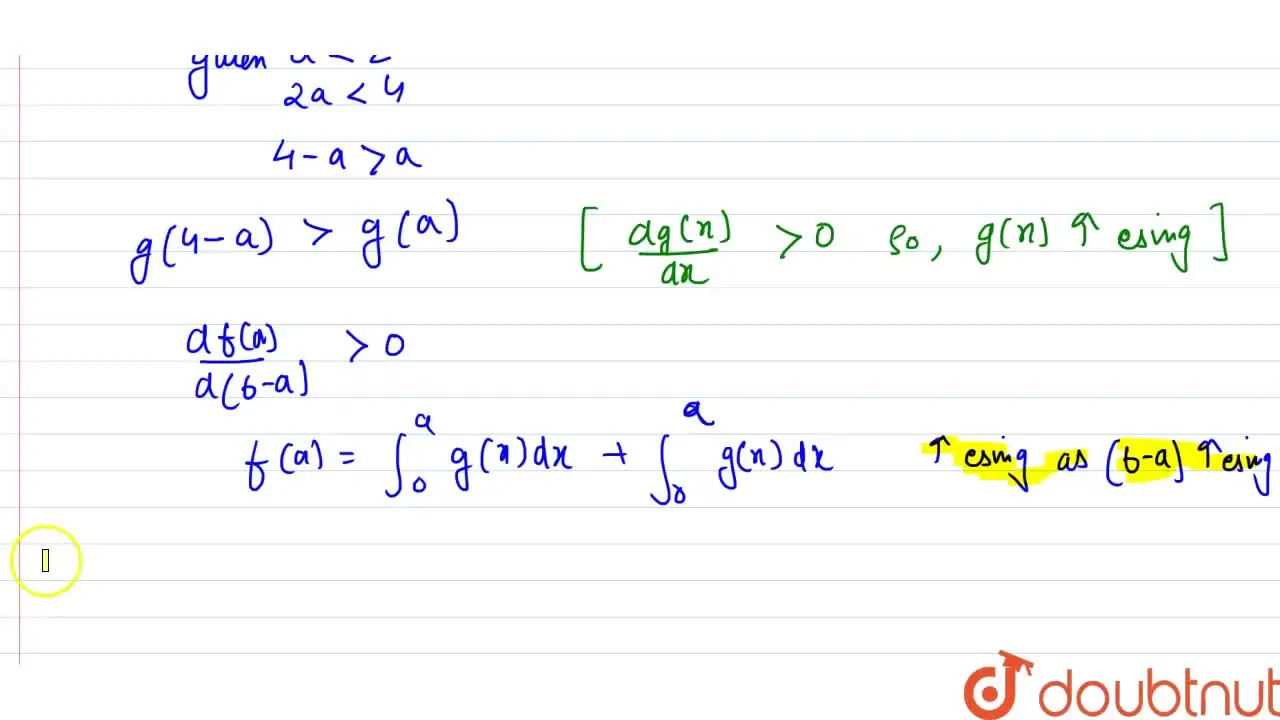Let a+b=4,wherea<2,andletg(x) be a differentiable function. If dgdx>0 for all x, prove that ∫a0g(x)dx+∫b0g(x)dx∈crerasesas(b−a)∈crerases.
Video Solution
Text Solution
a+b=4 or b=4−a
Let f'(a)=∫a0g(x)dx+∫b0g(x)dx
=∫a0g(x)dx+∫4−a0g(x)dx
∴df(a)da=g(a)−g(4−a)
Now, df(a)d(b−a)=df(a)d(4−2a)=df(a)−2da=(g(4−a)−g(a))/2
given a<2
or 2a<4
or 4−a>a
or g(4−a)>g(a)[∵dg(x)dx>0. So g(x) is an increasing function]
Thus, df(a)d(b−a)>0
Therefore, f(a)=∫a0g(x)dx+∫a0g(x)dx increases as (b−a) increases.
|
Updated on:21/07/2023
Related Playlists
- BOOK - CENGAGE ENGLISHCHAPTER - DEFINITE INTEGRATION EXERCISE - CAE_TYPE88videos
DEFINITE INTEGRATION
- BOOK - CENGAGE ENGLISHCHAPTER - DEFINITE INTEGRATION EXERCISE - SCQ_TYPE113videos
DEFINITE INTEGRATION
- BOOK - CENGAGE ENGLISHCHAPTER - DEFINITE INTEGRATION EXERCISE - JEE ADVANCED38videos
DEFINITE INTEGRATION
- BOOK - CENGAGE ENGLISHCHAPTER - CURVE TRACINGEXERCISE - EXERCISES24videos
CURVE TRACING
- BOOK - CENGAGE ENGLISHCHAPTER - DETERMINANTEXERCISE - Multiple Correct Answer5videos
DETERMINANT
Similar Questions
Let a+b=4,wherea<2,andletg(x) be a differentiable function. If dgdx>0 for all x, prove that ∫a0g(x)dx+∫b0g(x)dx∈crerasesas(b−a)∈crerases.
View SolutionLet a+b=4,wherea<2,andletg(x) be a differentiable function. If dgdx>0 for all x, prove that ∫a0g(x)dx+∫b0g(x)dx∈crerasesas(b−a)∈crerases.
View SolutionProve that∫10xexdx=1
View Solutionprove it 2e−14<∫20ex2−xdx<2e2
View Solution∫10e2xeex dx =)
View Solution∫10000ex−[x]dx
View SolutionEvaluate ∫badx√x,wherea,b>0.
View SolutionEvaluate ∫badx√x,wherea,b>0.
View Solution∫10exdx1+ex
View SolutionProve that ∫x0ext−t2 dt=ex24∫x0e−(t24)dt
View Solution


